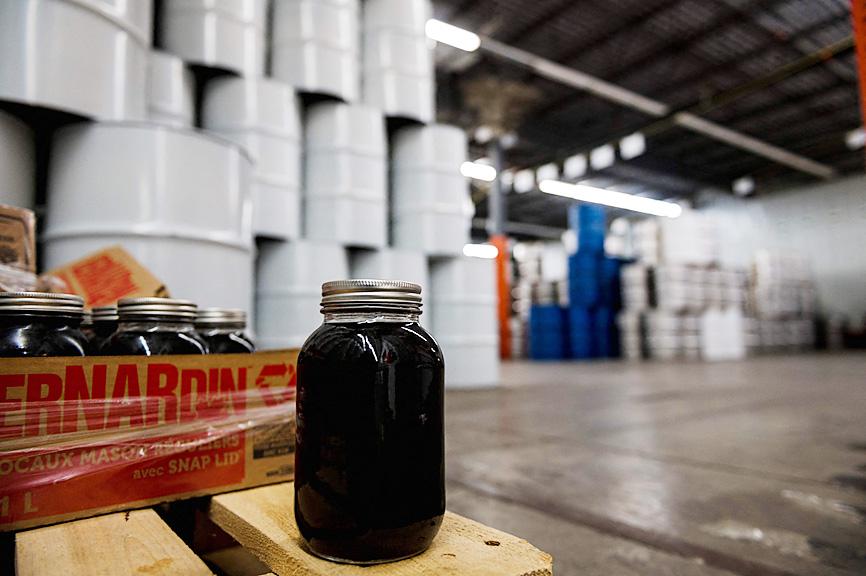Pancake lovers, fear not. Strong demand for maple syrup after a poor Canadian harvest has created supply-side woes, but Quebec province is tapping its strategic reserves to keep the world awash in the sweet, sticky stuff.
Experts are warning that the shortages could be further compounded by climate change, which is already being blamed for last spring’s shorter and warmer sugaring season.
To avoid shortages, the Quebec Maple Syrup Producers said it has released more than half of its stockpile of syrup.

Photo: AFP
“It’s normal, that’s what we want: The reserves must be the buffer between temperature, demand and production,” organization president Serge Beaulieu said.
Quebec makes almost three-quarters of the world’s supply, and the organization — sometimes called the OPEC of maple syrup — represents more than 11,000 producers.
The group’s massive reserves in the town of Laurierville, near Quebec City, are emblematic of Canada’s hugely lucrative maple syrup industry.
Housed in a warehouse the size of five football fields, tens of thousands of barrels, each containing 205 liters, are stacked row upon row, up to the ceiling.
In Canada, maple syrup is serious business. Often called “Quebec gold” in the region, it sometimes has been treated more like gold itself.
During the “Great Canadian Maple Syrup Heist” a decade ago, thieves stole C$18.7 million (US$14.5 million at the current exchange rate) worth of maple syrup from the facility.
However, at present, the only siphoning is to relieve market shortages: At the start of the year, about 105 million pounds (47.6 million kilograms) were stored there. The stockpile has since been whittled down to only 37 million pounds.
The sap harvest usually starts in March, when temperatures are above freezing during the day, but below 0°C overnight.
Harvesters traditionally hammered spiles into tree trunks and let the sap drip into buckets, but now collect it from multiple trees at once through a system of tubing, for refining.
Producer Laurie Larouche, 23, told reporters that “last spring was cut short because it got hotter faster than usual so instead of having a good month of harvest we had perhaps only two weeks plus a few days here and there.”
“We produced 50 percent less syrup” this year, Maryse Nault said, as she trudged through the snow to inspect spiles in trees on her farm in Saint-Marc-sur-Richelieu, 50km east of Montreal.
The province’s total yield fell to 133 million pounds of maple syrup, about 20 to 40 pounds less than in four of the previous five years, according to the producer cartel’s data, and far short of the 175 million pounds sold last year.
Researchers at the Quebec Ministry of Forests have concluded that the yield per maple tree could fall by as much as 15 percent by 2050, due mostly to increasingly warm weather in the month of April.
Meanwhile, sales have doubled over the past decade, including a 20 percent jump in just the first six months of this year compared with the same period the previous year.
Due to this rising demand, which has occurred both domestically and in key export markets such as the US, Germany and Japan, producers have been authorized by the province’s maple syrup federation to tap 7 million additional trees over the next three years, bringing the total to 57 million.
The COVID-19 pandemic is partly to blame for the recent surge in demand, Beaulieu said.

Airlines in Australia, Hong Kong, India, Malaysia and Singapore yesterday canceled flights to and from the Indonesian island of Bali, after a nearby volcano catapulted an ash tower into the sky. Australia’s Jetstar, Qantas and Virgin Australia all grounded flights after Mount Lewotobi Laki-Laki on Flores island spewed a 9km tower a day earlier. Malaysia Airlines, AirAsia, India’s IndiGo and Singapore’s Scoot also listed flights as canceled. “Volcanic ash poses a significant threat to safe operations of the aircraft in the vicinity of volcanic clouds,” AirAsia said as it announced several cancelations. Multiple eruptions from the 1,703m twin-peaked volcano in

A plane bringing Israeli soccer supporters home from Amsterdam landed at Israel’s Ben Gurion airport on Friday after a night of violence that Israeli and Dutch officials condemned as “anti-Semitic.” Dutch police said 62 arrests were made in connection with the violence, which erupted after a UEFA Europa League soccer tie between Amsterdam club Ajax and Maccabi Tel Aviv. Israeli flag carrier El Al said it was sending six planes to the Netherlands to bring the fans home, after the first flight carrying evacuees landed on Friday afternoon, the Israeli Airports Authority said. Israeli Prime Minister Benjamin Netanyahu also ordered

Former US House of Representatives speaker Nancy Pelosi said if US President Joe Biden had ended his re-election bid sooner, the Democratic Party could have held a competitive nominating process to choose his replacement. “Had the president gotten out sooner, there may have been other candidates in the race,” Pelosi said in an interview on Thursday published by the New York Times the next day. “The anticipation was that, if the president were to step aside, that there would be an open primary,” she said. Pelosi said she thought the Democratic candidate, US Vice President Kamala Harris, “would have done

Farmer Liu Bingyong used to make a tidy profit selling milk but is now leaking cash — hit by a dairy sector crisis that embodies several of China’s economic woes. Milk is not a traditional mainstay of Chinese diets, but the Chinese government has long pushed people to drink more, citing its health benefits. The country has expanded its dairy production capacity and imported vast numbers of cattle in recent years as Beijing pursues food self-sufficiency. However, chronically low consumption has left the market sloshing with unwanted milk — driving down prices and pushing farmers to the brink — while